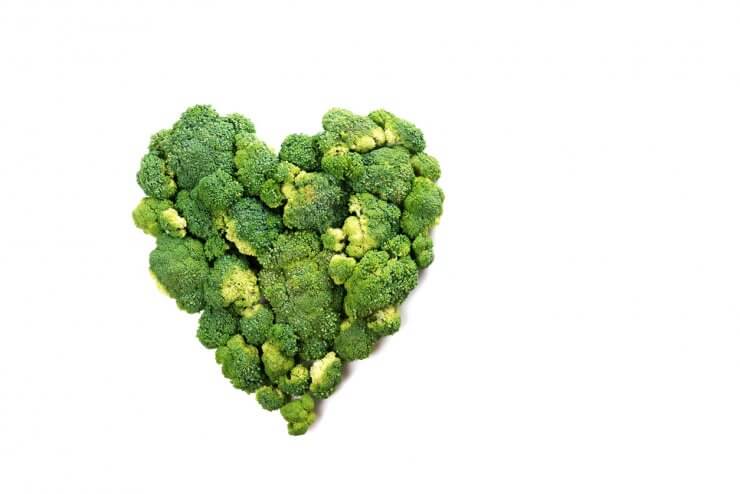
Fresh, healthful broccoli in the shape of a heart

Fresh, healthful broccoli in the shape of a heart
Broccoli is one powerful vegetable! Rich in antioxidants and plant compounds, broccoli can protect your heart, increase good (HDL) cholesterol, lower your blood pressure, protect against cancer, and help control blood sugar. The vitamin C in broccoli helps boost your immune system and helps neutralize free radicals in your body. And your body can’t store vitamin C, so you need to be sure to get your daily requirement.
Here are some of the other ways broccoli contribute to good health—plus a note of caution.
Heart health
Heart disease is the most common form of death worldwide. Consumption of foods high in vitamin C, like broccoli, has been linked to reduced heart disease.
Vitamin C also contributes to lower incidences of stroke, especially among people who are overweight or have high blood pressure. However, people who drink or smoke heavily are less likely to enjoy the added benefits of vitamin C.
The flavonoids in broccoli may help reduce women’s risk of ischemic stroke.
The fiber in broccoli can help decrease blood cholesterol levels.
Cancer prevention
Studies have linked broccoli and other cruciferous vegetables to a possible reduction in the risk of many types of cancer, including breast cancer, prostate cancer, and gastric, colo-rectal, kidney, and bladder cancers. Researchers think this may be due to bioactive compounds found in broccoli.
Weight loss
Broccoli contains soluble fiber, so eating broccoli may help people feel full sooner and resist cravings. Broccoli adds flavor and fiber to dishes without adding many additional calories.
Digestive health
Broccoli has high levels of soluble dietary fiber. That’s great news for people who occasionally experience constipation or suffer from other gastrointestinal issues. Eating fiber- and antioxidant-rich foods like broccoli may play a role in maintaining healthy gut function. Caution: Like other cruciferous vegetables, broccoli also contains high amounts of insoluble fiber that takes a long time to digest. Insoluble fiber helps you feel full longer but can also cause gas and flatulence. Try not to eat broccoli shortly before bed, as the prolonged digestion can keep you awake.
Pregnancy health
Folate is essential for the healthy development of babies in order to prevent neural tube defects, such as spina bifida. Prenatal vitamins include folate (also called vitamin B9), but broccoli is a great natural source of this essential vitamin.
Skin health
The vitamin C in broccoli may contribute to healthier skin—reducing the development of wrinkles and contributing to more hydrated skin and fewer blemishes. Studies have also found that compounds in broccoli may prevent UV radiation damage that leads to skin cancer.
Bone and joint health
Broccoli is a good source of calcium and vitamin K, which contribute to strong bones. Broccoli also contains phosphorus, zinc, and vitamins A and C, other sources of nutrients that promote strong bones and joints, and that may help prevent osteoarthritis.
Dental and oral health
Broccoli is a good source of vitamin C and calcium, both associated with a decreased risk of periodontal disease. Kaempferol, a flavonoid found in broccoli, may also play a role in preventing periodontitis. And some studies have also shown broccoli to be helpful in preventing oral cancer, whitening teeth, and preventing plaque.
Brain health
Compounds found in broccoli—in particular, kaempferol and sulforaphane—may slow mental decline and support healthy brain and nervous tissue function.
Did you know that broccoli is so healthful? Did you know about the potential pitfalls of consuming broccoli? Please tell us how you use broccoli.



